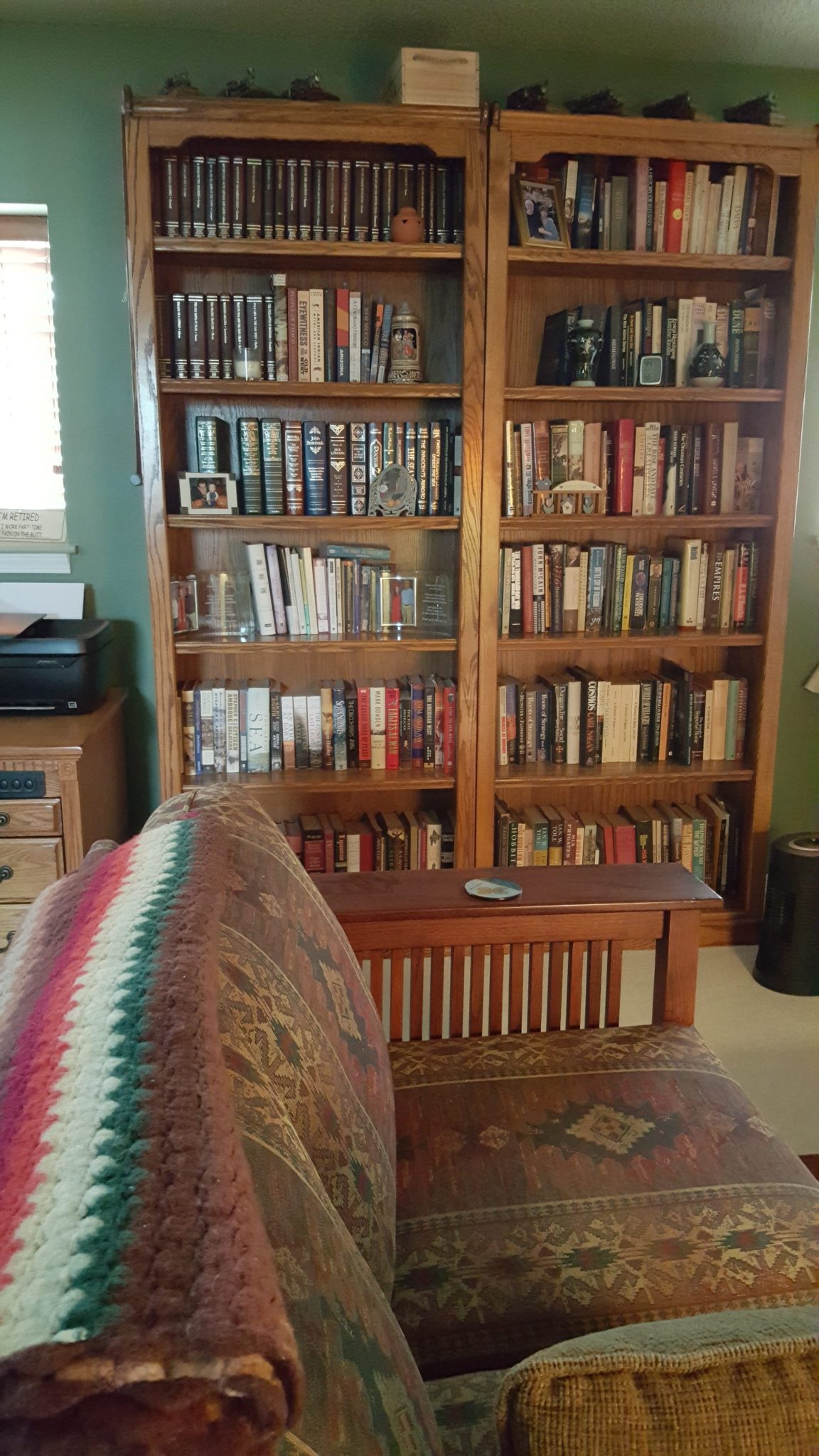“Books are the plane, the train, and the road. They are the destination, and the journey. They are home”.
Anna Quindlen

One of the ironies of my life it that I finally got the personal library I’d always dreamed about just in time for e-readers like the Kindle and Nook to make actual books obsolete. Eat your heart out Alannis Morissette.
I spent many years imagining what my personal library would look like. My “ideal” library would include first edition hardcover books, an expensive globe along with maps and art on the walls, and a comfy chair next to a fireplace. Something like this:

OK, so my library is not even close to being this extravagant. It is however mine and Mrs. Vintage’s library, and it suits us just fine. Numerous books, a gas fireplace, knick-knacks from our travels and my military career, photos of loved ones, a teeny-tiny globe and a comfy southwestern style loveseat. Is a personal library obsolete? Probably, but that’s ok, I’m kind of obsolete as well.

Many more books than this!
Now you may be asking yourself what does it take to make a personal library of one’s own? Even if you’re not asking yourself that, I’m gonna tell you. A shelf with a few books on it is obviously the bare minimum. But to make a library that you want to spend time in requires a little more. Good lighting ranks just below books on the shelf in importance. If you can’t read your books because you can’t see the pages, then it’s not much of a library. More of a book repository.
A comfy seat or sofa is also a must.
Beyond that, what you add to make your library your personal space is entirely up to you. Some people have books and nothing but books in theirs, while others like to add personal touches to humanize the space. Art works or photos perhaps. Porcelain dolls or antique muskets. The possibilities are endless.
Take for example this man’s library:

I figure this library is from the mid-1960’s, but there are a lot of cool features (and some nits to pick as well) that make it timeless. The bookcases with the built in overhead lighting is awesome! You can grab a book, plop down on the couch and start reading immediately. The whole study appears to be well lit. I especially love the office area: it’s facing out into the room and yet is set apart from the library itself. This neatly divides the reading area from the work area.
Now to the nits: the couch and chairs in the reading area do not appear to be very comfortable and thus not conducive to relaxing reading. This tends to give the space more of an office feel instead of a study. The glass coffee table is aesthetically pleasing but putting an ottoman there instead would allow the reader put his feet up and relax. Dig the old dictation machine on the table. All the hep cats have them you know.
Now back to the good: notice the personal effects the owner has put in his study to make it unique to him. If you look above the office area, you will see he has put several fishing rods and a duck decoy. This tells us he is what we used to call a “sporting man”. In other words, he likes fishing and hunting. He has a few photos scattered around the room; some on the bookcases and one on the coffee table. Photos are good, they imply there is more to your life than just books!
But the coolest feature of this library is the maps and clocks behind the desk, especially the clocks. In this digital age where you can call up a map or find what time it is anywhere in the world just by looking at your phone, there is something so romantic about that clock/map wall.
FROM THE NIGHTSTAND

The Rise of Athens by Anthony Everitt
I read Anthony Everitt’s “The Rise of Rome” a few years ago and found it to be an excellent book about the rise of the Roman Republic and the beginnings of the Roman Empire. So, I was looking forward to reading his “Rise of Athens”.
Unfortunately, I was very disappointed by “The Rise of Athens”. My biggest issue is that Everitt’s book doesn’t discuss the WHY of Athens rise. What made Athens so different from the other city-states? Was it because of democracy? Then why didn’t the other Greek cities that were also democracies become historical powerhouses? While “Rise of Athens” covers the basics of Athenian democracy, it doesn’t go much into the effects this system of government had on the Athens and the other Greek cities.
Perhaps it was just simply all the wealth from the silver mines of Laurium made Athens the cultural powerhouse of its age. Again, the book tells us the how but doesn’t go into the why.
Everitt attempts to give us a look at life of the citizens of Athens, but most of what he writes about comes across more like “Lifestyles of the Rich and Famous Athenians”. Too much material covering the scandals and gossip of the 4th century B.C., and not enough about what daily life was like for the average Greek citizen.
Ironically enough, the best part of the book is toward the end when Mr. Everitt covers the Decline and Fall (and partial recovery) of Athens. Here we get some insight into the lives of the citizens and how the changing fortunes of their city actually affected them.
I will be honest, a lot of this book was a slog. There is no doubt that “Athens” is well researched and the writing itself is good. It’s just not a very interesting book. Because the last third of the book actually is interesting I am willing to upgrade it to two (2) thumbs up. For a better look at the lives and times of the Greeks during this period I would recommend Victor Davis Hanson’s “A War Like No Other”.


ON THE BOOKSHELF

Speaking of Victor Davis Hanson, he has recently released a massive tome on WWII called “The Second World Wars: How the First Global Conflict Was Fought and Won”. I haven’t started this book yet because I have been reading a lot of WWII book lately, and I want to expand my horizons.
Nevertheless, I will be cracking it open soon. Hanson’s thesis is that the Axis Powers were prepared to win local border conflicts, but once the war broadened into a worldwide conflagration the Axis was effectively doomed.

